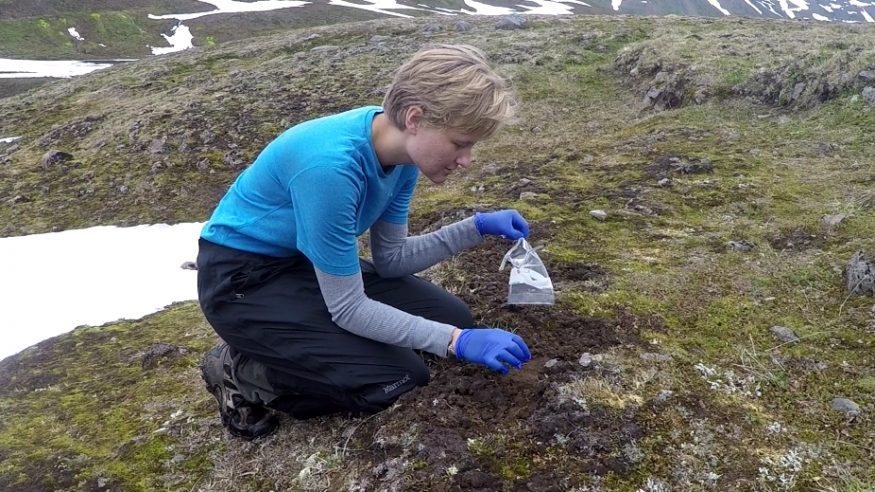
Mega Research
Ohio Wesleyan Microbiology Student Studies Viruses in Iceland
Name: Delanie Baker ’19
Major: Microbiology
Hometown: Santa Paula, California
Experience: Theory-to-Practice Grant, “Investigating the Prevalence of Megaviruses in Iceland”
Baker spent a month in Iceland over the summer, where she completed specialized training at the University of Akureyri and collected environmental samples to isolate and identify megaviruses. Back at Ohio Wesleyan, she is continuing her OWU Connection experience by using OWU’s scanning transmission electron microscope to examine the samples.
Lessons learned
“During the first two weeks in Iceland, I participated in the Arctic Microbial Ecology Course at the University of Akureyri. During this course, I learned the ins and outs of designing and executing field work, including simple design, collecting metadata, collecting samples, and challenges to expect when conducting field work.
“I also conducted research with scientists from Iceland, the U.S., and the U.K. to practice field work, become familiar with Icelandic terrain, and learn different techniques from scientists around the world. New microbial culture techniques were learned and used to isolate bacteria that infect plants from common Icelandic lichen species. …
“While in the field, I collected 23 samples from sea water, black sands, old and young volcanic soils, man-made woodland soil, glacial fed river waters, waters from snow melt, brackish water, and stagnant, microbial-laden waters. All samples were collected at the soil-water, soil-air, and water-air interfaces, where megavirus hosts are usually found.
“Along with samples, a range of metadata was collected in the field. This included GPS coordinates of each site, photographs of each site, and habitat data and soil data from the Icelandic Institute of Natural History and the European Nature Information System for species and habitat types. These data can be used to make hypotheses about the microbial ecology of the sampled areas. …
“The main moral I learned from this was patience and flexibility in the context of research. … I learned that it’s OK for things to not go as planned. What is important is having the ability to think on your toes and change plans to fulfill your goal. …
OWU mentors
“This project was a complete immersion in microbiology. I experienced much of what microbiology research looks like in a graduate setting, and through this, I’ve come to value the microbiology lab skills I’ve learned from BOMI (Botany-Microbiology) courses at OWU.
“After working with scientists from different labs around the world, from post-docs to undergraduate students, I found that I often had more skills than my peers. I hadn’t realized how Ohio Wesleyan prepares their students, especially in the sciences, until this trip. This has motivated me to finish my senior year strong and keep expanding my academic skills through engaging in new experiences. ...
“I am currently doing an independent study with Dr. Laura-Tuhela Reuning and Dr. Suren Ambegoakar for sample analysis. In this process, I am learning new techniques and experiencing firsthand the trials and successes of conducting independent research.”
My plans after graduation
Baker is considering a doctoral degree in environmental microbiology.
“I learned a handful of new techniques and ways of thinking … that will apply to my future in microbiology. From new lab techniques and field experience to applying analytical thinking across disciplines and working with flexibility, these skills will be transferable to any research position, graduate or Ph.D. program, or any professional endeavor I pursue. Ultimately, I’d like to end up in the field, and this was my first field work experience.”
Baker previously earned an American Society for Microbiology Undergraduate Research Fellowship, including a $4,000 research stipend, to support her studies in Iceland. The society also will fund her travel to the 2019 Microbe Meeting in San Francisco to present her results.
